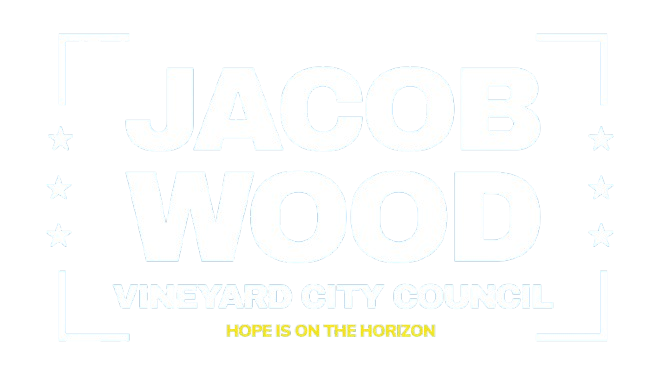“Utah City”
Vineyard is at a critical point in its development, and how we approach the newly planned Utah City district will shape the future of our community. While I fully support the need to expand Vineyard’s tax base and create a thriving business district, I do not believe that Utah City, as it is currently envisioned, aligns with the character and values of Vineyard. The name itself is problematic—it creates the impression of a separate entity rather than an extension of our city. Names matter because they reflect identity, and I believe this district should be better integrated into the fabric of Vineyard. I want to work transparently with developers while also using the city’s leverage to push for a name that reflects our community—something like Vineyard Square would maintain a connection to our city rather than making it feel like an isolated, high-density development.
Beyond the name, the vision for this area must be one that prioritizes a family-friendly, business-centered environment rather than a high-density, out-of-touch urban experiment. With the newly announced Huntsman Cancer Institute being built nearby, this is an incredible opportunity to shape the area into a true economic and entertainment hub that benefits Vineyard residents. I envision a district that includes local businesses, entertainment venues, an amphitheater for concerts, plays, and graduations, and even family-friendly attractions like go-karts and community gathering spaces. Additionally, with Utah Valley University establishing a presence here, I would love to open discussions about a potential UVU football stadium—a project that could serve as a major anchor for growth, bringing businesses and opportunities that benefit the entire community.
While I respect property rights and believe in working collaboratively with developers, the use of public resources, RDA funds, and taxpayer money gives the city the responsibility—and the leverage—to establish a framework that ensures development aligns with the interests of Vineyard residents. High-density, parking-deficient projects that prioritize special interests or outside investors should not dictate the future of this district. If public money is involved, there must be clear expectations that developments will serve the broader community and enhance our tax base in a way that benefits everyone.
This should not be a disconnected, high-rise urban core built for speculative investors—it should be a true downtown for the people of Vineyard. Development should be a collaborative effort, not driven by personal vendettas or unchecked outside influence. The goal is to bring everyone to the table—residents, developers, and experienced planners—to ensure that we create a district that strengthens Vineyard’s future without compromising the character of our city. Thoughtful growth is key, and I am committed to making sure Vineyard’s expansion is guided by smart, community-focused development.
